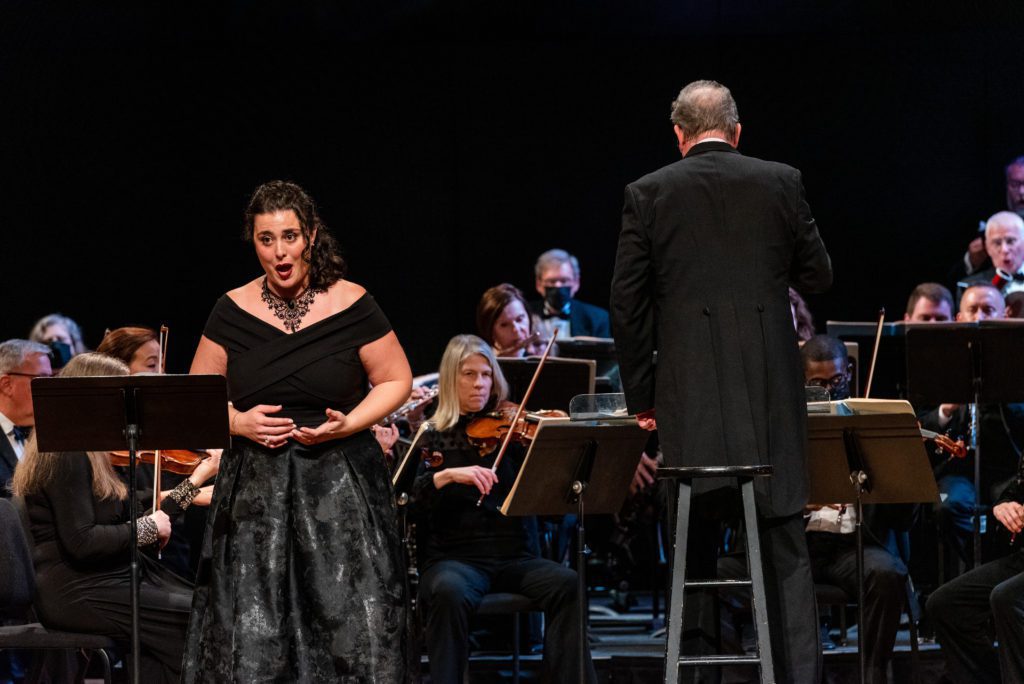Washington Concert Opera: One Down, One to Go
By • December 8, 2022 0 1978

Opera without lavish sets and costumes? With the singers lined up facing music stands and the orchestra behind them, not in a pit?
If that strikes you as no way to opera-ate, you haven’t experienced the joys of concert opera.
Washington Concert Opera’s motto comes right to the point: “It’s all about the music.” On Dec 4, at WCO’s one-night-only performance of Gaetano Donizetti’s “Roberto Devereux,” the music brought the Lisner Auditorium audience to its feet.
Vocal connoisseurs have kept WCO in business since its founding in 1986 by Stephen Crout and his life partner (and later husband) Peter Russell. Crout, who led WCO until 2001, passed away last November; Russell, who has headed up Vocal Arts DC since 2012, continues to write program notes and give pre-performance talks for the opera company.
Russell’s Dec. 4 notes explained that the main roles in “Roberto Devereux” — Queen Elizabeth I; the Duke and Duchess of Nottingham; and Devereux, the 2nd Earl of Essex, a “favorite” of the much-older queen — were conceived by Donizetti and his librettist, Salvadore Cammarano, to display the strong emotions the Neapolitan opera audience had come to expect.
Elizabeth (Elisabetta) is not the stiff, bejeweled “Virgin Queen” of her Tudor portraits. She is instead, writes Russell, “a hot-blooded female who is herself governed by uncontrollable passions and traffics in sexual politics.”
“Are you not in love? Mind how you answer!” demands the jealous queen (as translated from Italian in the projected supertitles).
Though Devereux denies he loves another, he is indeed in love with Sara, Duchess of Nottingham. Elizabeth had pressured Sara into marrying Devereux’s best friend, the Duke of Nottingham, while Devereux was off losing battles in Ireland.
Donizetti and Cammarano had collaborated earlier on “Lucia di Lammermoor,” which had its premiere at the Teatro di San Carlo in Naples in 1835, two years before “Roberto Devereux.” Based on “The Bride of Lammermoor,” a historical novel by Sir Walter Scott — English and Scottish history were something of an Italian obsession — “Lucia” is famous for its Act 3 mad scene.
Less often performed than “Lucia” — one reason why WCO chose it — “Devereux” also has an Act 3 mad scene, when Elizabeth learns from a cannon blast (bass drum) that her unfaithful lover has been beheaded. Her plan to give him a last-minute reprieve was thwarted by Nottingham, enraged, as she was, by Devereux’s betrayal.
In this mad scene of paired arias, preceded by frantic pacing, suggesting how she would perform in a fully staged production, Roberta Mantegna brought down the house. A powerful dramatic soprano from Sicily making her U.S. debut, Mantegna recently sang the role of Elizabeth in Venice. Given that she studied at the Palermo conservatory named for composer Vincenzo Bellini, one might say she was born to sing bel canto.
Mantegna was well-matched by mezzo-soprano Elizabeth DeShong, who sang the Duchess of Nottingham with exceptional clarity, and baritone Ricardo José Rivera as a lyrical — and fierce when called for — Duke. The absence of sets and costumes was forgotten during their strong and moving duets.
Unfortunately, tenor Andrew Owens, who replaced René Barbera, originally cast as Devereux, did not have a good night. Owens held his own in the trio with Mantegna and Rivera late in Act 2, but in general his voice did not rise to the (very high) level of the other leads. And though he soldiered on, a throat issue interrupted his singing in the Act 3 “tower scene,” set in the Tower of London.
Leading the 51-member orchestra was WCO Artistic Director & Conductor Antony Walker, recovering from knee surgery, who continually conveyed fresh energy to the instrumentalists while coordinating closely with the adjacent, front-facing singers — another benefit of concert opera.
Walker also provided the libretto’s English translation, which made the performance easy to follow. The chorus, under the direction of David Hanlon, gave its 42-voice commentary on the action solidly from behind the orchestra (there was, of course, no dressing up as courtiers or Londoners).
The remaining performance in WCO’s 2022-23 season at Lisner is Giuseppe Verdi’s 1842 “Nabucco” — “a late flowering of bel canto,” according to Walker — at 6 p.m. on March 4, a Saturday instead of the usual Sunday.
Making fewer demands on vocalists’ time, WCO is able to secure outstanding singers new to D.C. or rarely heard here. Cast in “Nabucco”: baritone Lester Lynch as Babylonian ruler Nebuchadnezzar II; soprano Alexandra Loutsion as Abigaille, his elder daughter (or is she?); bass Peter Volpe as Zaccaria, high priest of the Jews; and tenor Andres Acosta as Ismaele, nephew of Zedekiah, king of Jerusalem.
Note: Since this is concert opera, plan to picture the Hanging Gardens of Babylon in your mind.

